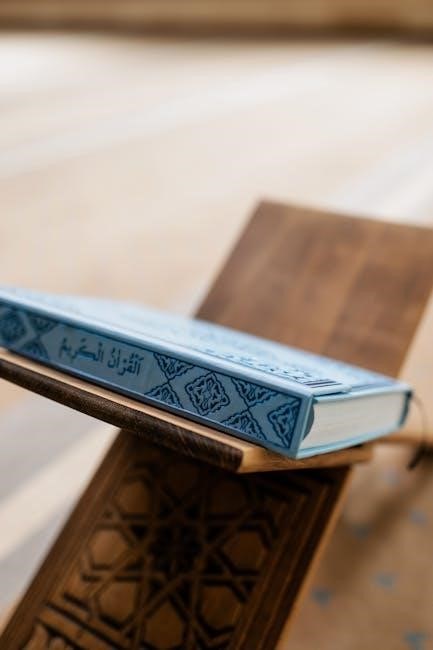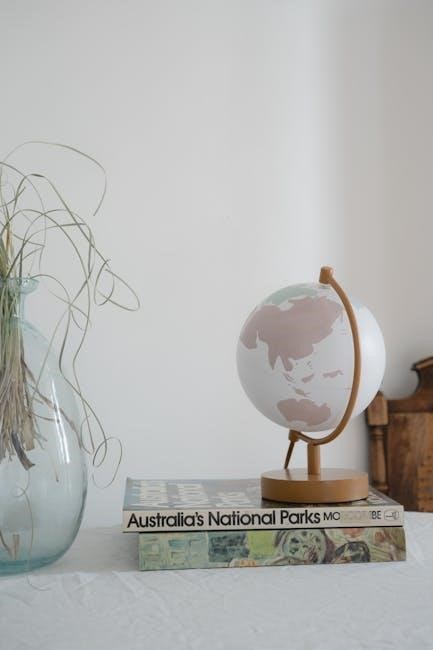The Dua Khatam Quran is a significant Islamic practice, expressing gratitude and seeking blessings upon completing the Quran. It strengthens spiritual connection and reflects deep devotion.
Significance of Dua Khatam Quran
The Dua Khatam Quran holds profound significance as a supplication recited upon completing the Quran, expressing gratitude and seeking divine blessings. It reflects a deep connection with Allah, acknowledging the mercy and guidance received through the Quran. This practice strengthens one’s spiritual bond and serves as a means to request forgiveness, wisdom, and steadfastness. The supplication is not just a ritual but a heartfelt expression of devotion, emphasizing the believer’s commitment to implementing the Quran’s teachings in their life. Its significance lies in its ability to inspire reflection and seek Allah’s continued mercy and guidance.
Overview of the Khatam Quran PDF
The Khatam Quran PDF is a comprehensive resource designed to guide believers in reciting the Dua Khatam Quran. It includes the Arabic text, English translations, and transliterations, ensuring accessibility for all. The PDF features detailed explanations of the supplication’s meaning and significance, along with step-by-step instructions for proper recitation. Additionally, it highlights recommended supplications and reflects on the Quran’s message, making it a valuable tool for individuals and communities alike. Its digital format allows easy access on various devices, fostering a deeper connection with Islamic traditions and practices.
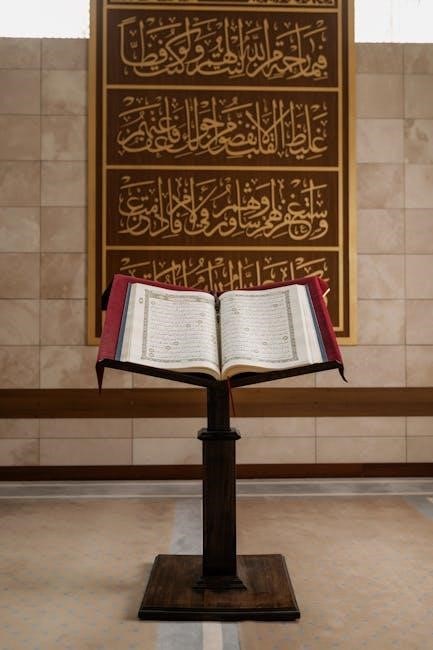
What is Dua Khatam Quran?
Dua Khatam Quran is a supplication recited upon completing the Quran, expressing gratitude and seeking blessings. It is a powerful prayer reflecting deep faith and devotion.
Definition and Meaning
Dua Khatam Quran refers to the supplication recited after completing the recitation of the Holy Quran. It is a heartfelt prayer expressing gratitude to Allah for the opportunity to complete the Quran. While there is no specific dua prescribed in the Sunnah for this occasion, Muslims are encouraged to make personal supplications seeking blessings, guidance, and mercy. This practice reflects a deep connection with the Quran and a desire to embody its teachings in daily life. The dua is a moment of reflection and spiritual renewal, emphasizing the Quran’s role as a source of light and guidance.
Importance in Islamic Practice
The Dua Khatam Quran holds profound significance as a means of expressing gratitude and seeking divine blessings after completing the Quran. This practice underscores the importance of reflecting on the Quran’s teachings and embodying them in one’s life. While there is no specific Sunnah dua for this occasion, making personal supplications demonstrates humility and devotion. It serves as a moment to reconnect with Allah, expressing appreciation for the guidance and wisdom gained through the Quran. This practice reinforces the Quran’s role as a source of spiritual growth and inspiration in a Muslim’s life.

How to Recite Dua Khatam Quran
To recite Dua Khatam Quran, face the Qiblah, raise your hands, and recite a heartfelt supplication. Begin with praise to Allah, then recite verses like Ayat-ul-Kursi or Al-Ikhlas before making your personal dua, seeking guidance and blessings. Conclude by wiping your hands over your face, embodying humility and gratitude for completing the Quran.
Step-by-Step Guide
Begin by facing the Qiblah and raising your hands in supplication.
2. Recite verses like Ayat-ul-Kursi or Surah Al-Ikhlas for spiritual enrichment.
3. Offer a heartfelt dua, expressing gratitude for completing the Quran.
4. Seek forgiveness, guidance, and blessings from Allah.
5. Conclude by wiping your hands over your face, symbolizing humility.
This method ensures a meaningful and sincere recitation of Dua Khatam Quran.
Recommended Supplications
Recommended supplications for Dua Khatam Quran include asking Allah for mercy, guidance, and protection. Muslims often recite verses like Ayat-ul-Kursi or Surah Al-Ikhlas before the dua. It is also advised to seek forgiveness and request blessings for understanding and implementing the Quran’s teachings. Raising hands in humility and facing the Qiblah is encouraged. Personal heartfelt prayers are also recommended, reflecting sincerity and devotion. These supplications align with the Quran’s message, fostering a deeper spiritual connection and gratitude for completing the Quran.
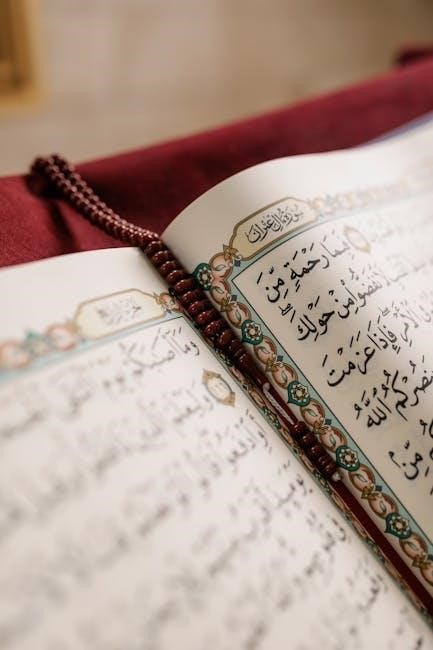
Benefits of Reciting Dua Khatam Quran
Reciting Dua Khatam Quran brings divine guidance, mercy, and protection. It strengthens faith, revives forgotten knowledge, and deepens the heart’s connection to Allah’s words, seeking enlightenment and purification.
Spiritual Rewards
Reciting Dua Khatam Quran is a profound act of worship, offering immense spiritual rewards. It seeks divine mercy, guidance, and purification, illuminating the heart and soul. This supplication strengthens one’s connection to Allah, fostering a deeper understanding of the Quran’s teachings. By expressing gratitude and humility, believers open themselves to Allah’s blessings, seeking enlightenment and spiritual growth. The Dua serves as a heartfelt plea for forgiveness, wisdom, and steadfastness on the righteous path, reflecting a sincere devotion to Allah’s divine will and mercy.
Divine Guidance and Mercy
Reciting Dua Khatam Quran is a heartfelt supplication seeking Allah’s divine guidance and mercy. It serves as a humble request for enlightenment, understanding, and protection. Through this dua, believers ask for the ability to live according to the Quran’s teachings, fostering righteousness and steadfastness. The supplication also seeks forgiveness and the strength to avoid sin, embodying a deep reliance on Allah’s grace. By invoking divine mercy, one hopes to draw closer to Allah, ensuring a path illuminated by His wisdom and compassion, and a heart filled with gratitude and submission to His will.
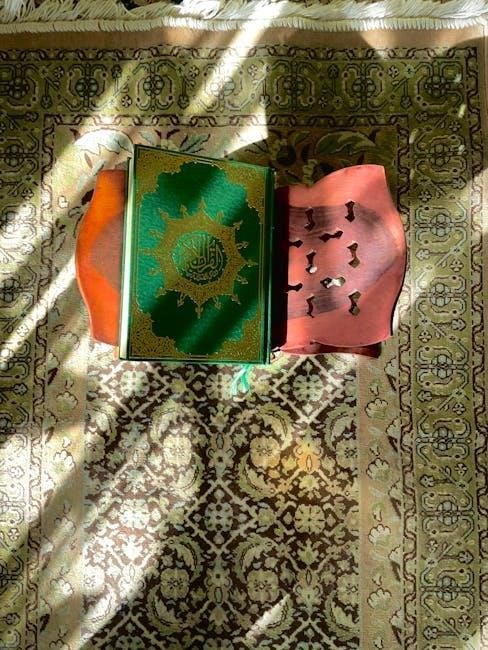
Recommended Dua for Khatam Quran
Dua Khatam Quran is a personal supplication, seeking Allah’s mercy, guidance, and protection. It involves asking for forgiveness, strength to avoid sin, and deep understanding of the Quran’s teachings.
Arabic Text and English Translation
The Arabic text of Dua Khatam Quran is:
اللَّهُمَّ اِنِّي أَسْأَلُكَ عِلْمًا نَافِعًا وَ عَمَلاً مُتَقَبَّلاً وَ هِدَايَةً وَ م Mercy and guidance upon completing the Quran. The English translation is: “O Allah, grant me beneficial knowledge, accepted deeds, and divine guidance.” This supplication seeks Allah’s blessings and reflects the seeker’s commitment to spiritual growth and obedience.
Transliteration for Easy Recitation
The transliteration of Dua Khatam Quran is provided to assist non-Arabic speakers in reciting it accurately. It helps in understanding and pronouncing the Arabic text correctly. For example, the transliteration begins with: Allahumma inni as-aluka ilman nafi’an wa amalan mutaqabbalan… This transliteration aids in maintaining the spiritual connection and ensures the supplication is recited with proper articulation, making it easier for everyone to benefit from its blessings and divine mercy.
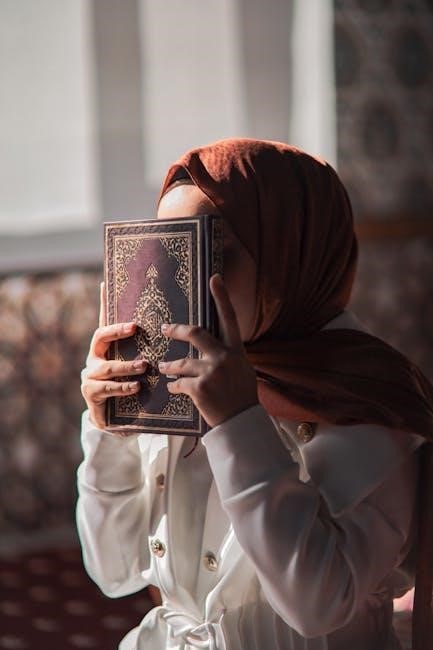
Cultural and Community Practices
Cultural and community practices surrounding Dua Khatam Quran often involve communal celebrations, shared spirituality, and collective gatherings. These practices strengthen bonds and foster a sense of unity among believers.
Conducting Khatam Quran Ceremonies
Khatam Quran ceremonies are conducted with great reverence, often involving collective gatherings and shared supplications. These events typically include the recitation of specific duaa, facing the qiblah, and raising hands in prayer. Participants may also perform actions like wiping their hands over their faces after duaa, seeking divine blessings. The ceremonies foster a sense of community and spiritual unity, emphasizing gratitude for completing the Quran and seeking guidance for the future. They are often accompanied by heartfelt supplications and reflections on the Quran’s teachings.
Community Celebrations and Gatherings
Community celebrations for Khatam Quran often involve collective gatherings, fostering unity and spiritual joy. These events may include shared meals, discussions, and reflections on the Quran’s teachings. Participants engage in heartfelt supplications, strengthening their bond with Allah and each other. Such gatherings highlight the importance of communal worship and shared gratitude, creating a sense of solidarity among believers. They also serve as opportunities to inspire others and deepen understanding of the Quran’s message, fostering a vibrant spiritual and cultural connection within the community.
Key Principles for Effective Supplication
Sincerity, devotion, and pure intention are essential. Focus on the Quran’s message, and supplicate with a humble, heartfelt approach, seeking forgiveness and divine blessings wholeheartedly.
Sincerity and Devotion
Sincerity and devotion are cornerstone principles for effective supplication in Dua Khatam Quran. The supplication must be offered with a pure heart, free from pretense, ensuring that the intention is solely to seek Allah’s pleasure. Devotion is reflected in one’s focus and humility while reciting the Quran and making the dua. Facing the qiblah, raising hands, and lowering the voice are recommended practices to enhance the act of supplication. Sincerity ensures that the dua is heartfelt and aligns with the teachings of the Quran, making it more likely to be accepted by Allah.
Reflecting on the Quran’s Message
Reflecting on the Quran’s message is a vital aspect of Dua Khatam Quran. It involves contemplating the teachings and lessons learned throughout the Quran, which helps in applying its guidance in daily life. This reflection strengthens one’s spiritual connection and makes the supplication more heartfelt and meaningful. By internalizing the Quran’s message, individuals seek not only blessings but also divine mercy and protection. This reflective practice enhances the supplication experience, fostering a deeper understanding and commitment to the faith, and ensuring that the Quran’s wisdom is integrated into one’s life effectively.
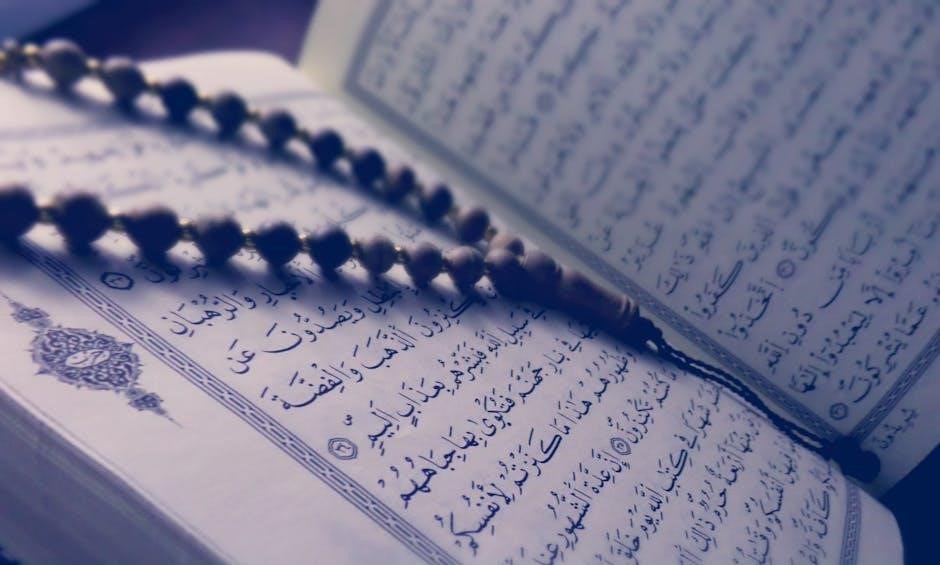
Dua Khatam Quran in Ramadan
Dua Khatam Quran holds special significance in Ramadan, offering a profound opportunity to seek divine mercy and blessings, enhancing spiritual connection and reflection during this sacred month.
Special Significance During Ramadan
Ramadan, the month of revelation, amplifies the spiritual rewards of Dua Khatam Quran. Completing the Quran during this blessed month is a cherished practice, as it aligns with the divine revelation of the Holy Book. The Dua carries additional significance, seeking Allah’s mercy and blessings in a time when worship is multiplied. Many Muslims conclude their Tarawih prayers with the Khatam Dua, expressing gratitude for the opportunity to recite the Quran and imploring Allah for guidance, forgiveness, and the ability to act upon its teachings throughout the year.
Combining Quran Recitation with Dua
Combining Quran recitation with Dua Khatam Quran creates a harmonious blend of worship and supplication. This practice enhances the spiritual experience, as it transitions from the divine words of revelation to heartfelt communication with Allah. Reciting the Quran with devotion and following it with sincere Dua strengthens one’s connection to Allah, seeking guidance, mercy, and blessings. This unity of recitation and supplication reflects the Islamic emphasis on integrating worship with personal reflection, fostering a deeper understanding of the Quran’s message and its application in daily life.
Final Thoughts on the Significance of Dua Khatam Quran
Dua Khatam Quran holds profound significance as a personal and heartfelt supplication, allowing believers to express gratitude and seek divine blessings. It is a moment of deep reflection, emphasizing the Quran’s role in guiding and transforming lives. While there is no specific prescribed dua, the act of supplication itself is a powerful means of connecting with Allah. By reciting Dua Khatam Quran, individuals reaffirm their commitment to faith and seek spiritual growth. Its adaptability to personal circumstances makes it a timeless and universal practice, fostering a deeper bond with the Divine.
